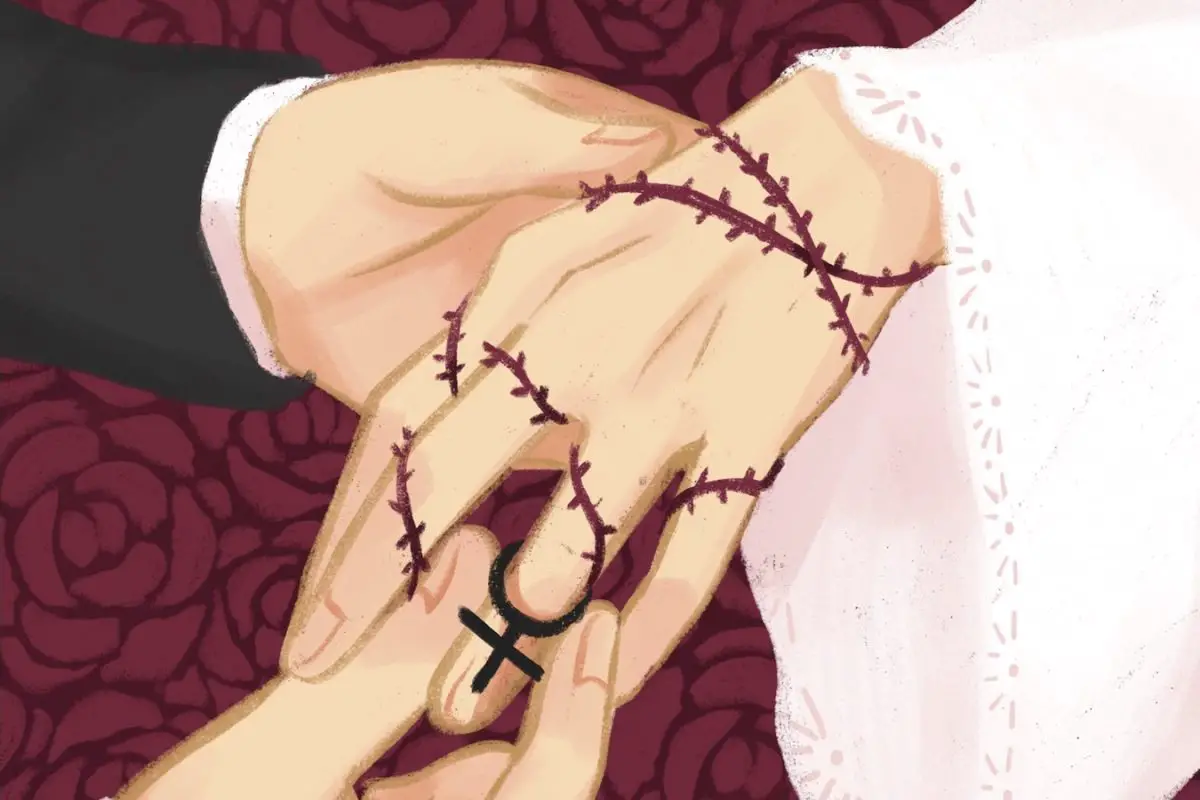Since its premiere in 2003, fans have swooned over “The Bachelorette.” From elaborate watch parties to themed wine nights, it seems as though viewers have gotten more and more creative with the ways they choose to watch the show. It’s full of romantic dates, exotic travels and intriguing drama. The show is entertaining and easy to watch for people of all ages and backgrounds. But pushing past the glitz and glam of the show, “The Bachelorette” promotes underlying themes and ideas that are not glamorous at all.
A series originally created to emphasize that women have the right to choose who they love, the show has been twisted to reinforce stereotypes about women and promote an environment of codependency and toxicity.
The premise of “The Bachelorette” is that a woman will date a large group of men and narrow them down through multiple rose ceremonies until there is one man remaining. The men that are not pinned with a rose are sent home. At the end of the season, the bachelorette will give only one man a rose. He will then propose to her, and it is assumed that they will live happily ever after.
As lighthearted and cliche as the show may seem, “The Bachelorette” has a number of underlying themes that viewers should make themselves aware of before choosing to binge the series.
“The Bachelorette” thrives off of drama. It feels as though franchise host, Chris Harrison, is always referring to the current season as the most dramatic yet. Tears, frustration and fighting certainly do seem to entertain the show’s viewers. But it is important to take a step back and think about how these theatrical clips are portraying women.
Ultimately, emotional breakdowns are what intrigue viewers and keep them watching. But by focusing on the bachelorette’s anguish and heartbreak, the stereotype that women are sensitive and illogical is reinforced.
“The bachelorette has to cry at least once an episode,” said franchise fan Abigail Ledbetter. “It makes for an interesting plotline but I do not really love the way it makes women look. We are more than our emotions and sometimes it seems like the producers are purposely cutting the show to make us look bad.”
Additionally, “The Bachelorette” is centered around relationships. Although in recent seasons producers have allowed more screen time for the bachelorette’s backstory, it sometimes feels as though viewers don’t know much about her apart from her relationships with the men on the show.
Women are often stereotyped and perceived as codependent. Society frequently refers to women in terms of their relationships with others rather than by their individual accomplishments.
“The Bachelorette” does not do much to stop this narrative. Rather, it contributes to the idea that women are created for relationships by focusing on their romantic involvements with the men of the show.
“Sometimes I wish I could know more about who the bachelorette is as a person,” admitted viewer Erica Pack. “Like the dates and everything are great but I would love to know more about her personal accomplishments and goals in life. Half the time we don’t even get to know the bachelorette’s job.”
The franchise has made recent efforts to diversify its bachelorette stars. The current season features the second-ever African American bachelorette, Tayshia Adams. However, the show still lacks diversity in the way it displays the typical gender roles of women.
Each season highlights women in elegant dresses, pristine makeup and glamorous hairstyles. The majority of the women found on the show all seem to be styled in this similar fashion throughout the entire series, which promotes traditional ideas of femininity.
Hannah Griffin, another “The Bachelorette” fan, agreed. She said, “I would love to see a bachelorette who dresses like me. I don’t get why they can’t wear a pants suit or something. There has to be at least one who is wanting to dress themselves that way.”
The goal of the show is for the bachelorette to be engaged by the end of the season. With only a few months of filming, there is high pressure to fall in love and to fall in love quickly. As innocent as this goal may seem, it reinforces the idea that women are codependent and need a man to be successful. The bachelorette is considered a “winner” if she finds a partner by the end of the season.
“I think its sweet that she gets engaged at the end,” continued Ledbetter. “I will say though I have caught myself craving male attention after watching the show. I want to feel the same sense of accomplishment that the bachelorette does when she gets engaged.”
Critical thinking is essential when considering what exactly it is that you’re allowing your brain to absorb. Even seemingly innocent and entertaining television shows can promote stereotypes that negatively contribute to society, and “The Bachelorette” is no exception.

















